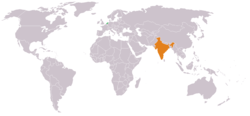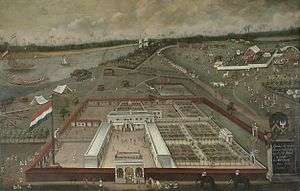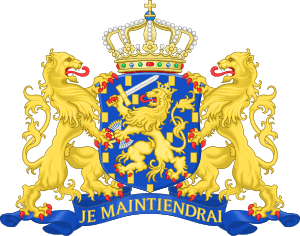India–Netherlands relations
 | |
Netherlands |
India |
|---|---|
India–Netherlands relations refer to foreign relations between India and the Netherlands. India maintains an embassy in The Hague, Netherlands and the Netherlands maintains an embassy in New Delhi and a consulate general in Mumbai. Both countries established diplomatic relations in 1947.
History

The India–Netherlands relations date back to the early 15th century as far as 1605 when the Dutch entered the Mughal Empire for trading purposes. Dutch presence on the Indian subcontinent lasted from 1605 to 1825. Merchants of the Dutch East India Company first established themselves in Dutch Coromandel, notably Pulicat, as they were looking for textiles to exchange with the spices they traded in the East Indies.[1] Dutch Suratte and Dutch Bengal succeeded in 1616 and 1627 respectively.[2][3] After the Dutch conquered Ceylon from the Portuguese in 1656, they took the Portuguese forts on the Malabar coast five years later as well, to secure Ceylon from Portuguese invasion.[4][5]
Apart from textiles, the items traded in Dutch India include precious stones, indigo, and silk across India, saltpeter and opium in Dutch Bengal, and pepper in Dutch Malabar. Indian slaves were imported on the Maluku Islands and in the Cape Colony.
In the second half of the eighteenth century the Dutch lost their influence more and more. The Kew Letters relinquished all Dutch colonies to the British, to prevent them from being overrun by the French. In the Battle of Colachel (1741), Travancore king Marthanda Varma's army defeated the Dutch East India Company, resulting in the complete eclipse of Dutch power in Malabar. Although Dutch Coromandel and Dutch Bengal were restored to Dutch rule by vitue of the Anglo-Dutch Treaty of 1814, they returned to British rule owing to the provisions of the Anglo-Dutch Treaty of 1824. Under the terms of the treaty, all transfers of property and establishments were to take place on 1 March 1825. By the middle of 1825, therefore, the Dutch had lost their last trading posts in India. Nevertheless, remains of the Dutch period can be found from Surat to Kolkata as well as in other parts of India.
State visits
In June 2015, Dutch Prime Minister Mark Rutte made an official visit to New Delhi where he held talks with Indian Prime Minister Shri Narendra Modi.[1][2]
In June 2017, Prime Minister Narendra Modi arrived in the Netherlands on the final leg of his three-nation tour during which he held talks with his Dutch counterpart Mark Rutte to strengthen bilateral ties.
In May 2018, Prime Minister Mark Rutte arrived in New Delhi for a 2 day official visit with various ministers from his cabinet to discuss about various issues[3].
Modern Era Relations
Economic Relations
.jpg)
India has developed into a rapidly expanding economy, focused on technological development and technical and scientific cooperation.
Despite the continuing economic crisis in the Euro Zone and slow growth of Dutch economy itself, bilateral trade between India and Netherlands continued to gather momentum. Trade and investment cooperation a key component of India–Netherlands relationship has shown satisfactory growth over the years. Two way trade continue to grow steadily, reaching Euro 5.287 billion in 2011.During first seven months of 2012,Indian exports increased by 9.6% while total bilateral trade increased 9.45%.
Netherlands remains among the top 10 partners of India in terms of trade volume with positive balance of trade in favour of India. It is also one of the largest investors in terms of Foreign Direct Investment (FDI) into India with Indian investments into Netherlands during the period 1996-2010 amounted to $11.46 billion. FDI inflows from Netherlands into India during the period 2000 to 2011 stood at US $5.62 billion (6th largest overall). FDI during financial year 2011-12 amounted to $1.409 billion.
Presently there are 174 Indian companies based in Netherlands attracted by Dutch taxation system which is transparent, stable, flexible and has no withholding tax on ongoing interests and royalty payments, advance tax assessment certainly and competitive corporate tax rate of 20-25% and no capital tax on contribution of capital.
There have been major acquisitions and mergers by Indian companies including that of Tata Corus (now Tata Steel), Apollo-Vredestein, acquisition of Theodoor Gilissen by Hinduja Group and many Indian companies and exploring the possibilities for further tie-ups.
The proposal for opening a branch of State Bank of India in Amsterdam is also under way. Many Dutch multinationals like Shell, Unilever, KLM and major banks like ING and Rabobank have growing and significant presence in India. Dutch SMEs with niche technologies and world class expertise are also actively looking at the Indian market. Similarly, several Indian major IT companies have established their presence in Netherlands.
- India, Netherlands hold talks to ramp up ties
External Affairs Minister Sushma Swaraj held wide-ranging talks with her Dutch counterpart Bert Koenders on stepping up bilateral engagement in a range of areas, including trade and investment, water, and education.
Swaraj and Koenders deliberated on the entire gamut of bilateral issues and agreed to take initiatives to strengthen ties in a number of sectors.
Relations between India and the Netherlands have largely been shaped by engagement in trade and investment. Dutch ships had come calling to Indian ports around 400 years ago.
The Netherlands is today one of India’s largest trading partners in the European Union.
Koenders’ arrived in Bengaluru on Sunday and met Karnataka’s Minister for Large and Medium Scale Industries R V Deshpande yesterday. He arrived in Delhi last evening.
- India, Netherlands sign three MoUs, Modi invites Dutch CEOs for investment
Describing the Netherlands as India’s "natural partner" in its economic development, Prime Minister Narendra Modi on Tuesday invited Dutch companies to invest in the country which he said was the "land of opportunities".
Focusing on trade, technology and investment, Modi interacted with CEOs of major Dutch companies after holding bilateral talks with his Dutch counterpart Mark Rutte.
The two countries signed three MoUs in the fields of social security, water cooperation and cultural cooperation.
During his interaction with top Dutch CEOs, Modi said the reforms introduced by his government seek to enhance ease of doing business and bring standards at par with global standards.
The prime minister, who is here on the final leg of his three-nation tour, said India has made 7,000 reforms for attracting FDI in various sectors including real estate and defence.
He said India is a "land of opportunities" with over 7 per cent growth rate and 1.25 billion population of which 800 million people are below 35 years.
Water is a prime sector for cooperation between the two countries, Modi said, referring to a joint water technology initiative, Dutch Indian Water Alliance for Leadership Initiative (DIWALI).
Irrigation and water conservation are the areas where the two countries can boost cooperation, he said.
Seeking investments, he said pension funds are especially welcome to India.
During the bilateral talks, Modi and the Dutch PM reaffirmed their commitment to climate change accord and strengthen cooperation in developing renewable energy.
Modi thanked the key European nation for backing India’s Missile Technology Control Regime (MTCR) membership.
"Ties between India and the Netherlands are very old. Our bilateral relations are very strong," he said.
He said that relations between India and the Netherlands are century old and the two countries will keep on moving towards stronger ties.
Modi said the Netherlands is the 5th largest investment partner globally and in the last three years it has emerged as the 3rd largest source of FDI for the country.
In the joint address, Rutte said India’s emergence as a global power is a "welcome development from both political and economic point of views."
"Political because of the values we share with respect of rule of laws and security," he said. He commended India for its commitment to renewal energy and to the Paris climate agreement.
He praised Modi for announcing major sustainable initiatives like ‘Clean India’ and ‘Make in India’. "The Netherlands is a key partner to help India achieve its goals," he said.
"India is now a global economic power. It is world’s second biggest economy and Indian market has a lot of potential. We have a plenty to offer to India too," he said.
He said Europe is India’s biggest trading partner and 20 per cent of India’s export to Europe enters through the Netherlands.
"So, for India, we are an entry (point) to Europe," he said.
The Dutch premier said the ties is only expected to grow in coming years. "Today we are giving fresh impetus to ties by easing the flow of capital in both directions. I believe this is one of the many ways to boost ties in the next 70 years and beyond," he said.
- Netherlands software vendor Dynacommerce opens R&D centre in Bengaluru
Dynacommerce’s IT solution Omnius is a quick and easy to deploy omni-channel and multi-play sales and delivery orchestration solution for telecommunication providers and utility companies.
The Netherlands-based software vendor Dynacommerce on Wednesday announced the launch of its research and development centre in Bengaluru.
"I am extremely delighted at the launch of Dynacommerce’s R&D Centre in Bengaluru, which will further enhance the economic cooperation between The Netherlands and India. Prime Minister Narendra Modi during his visit to The Netherlands in June had termed The Netherlands as a ‘Natural Partner’ in India’s economic development," Rene Beerepoot, the Attaché, Embassy of the Kingdom of the Netherlands, said on the occasion.
"This year India and The Netherlands are celebrating 70 years of diplomatic relationship. The Netherlands Prime Minister in his joint address with Prime Minister Modi said that easing the flow of capital in both directions gives fresh impetus to ties between the two countries," he added.
"The availability of world class talent, advanced infrastructure and proximity to other fast-growing emerging markets of the world are key reasons for us to start our first offshore facility in Bengaluru," said Dynacommerce Managing Director Rick Centeno.
Dynacommerce’s IT solution Omnius, according to founder John Jansen, is a quick and easy to deploy omni-channel and multi-play sales and delivery orchestration solution for telecommunication providers and utility companies.
"From being operations and delivery centres in the early 1990s, the centres in India are becoming innovation hubs focusing on digital initiatives, including advanced analytics, cognitive computing and machine learning, automation & robotics, and virtual reality (VR). We plan to double our strength by the end of 2017," Dynacommerce India Managing Director Saikat Mitra said. On 9 November 2017, Haryana Agriculture University (HAU), Hisar, and the Netherlands government decided to jointly work on a project to tackle issues like crop residue management.
Cultural Relations
For first time, an Indian Students’ Day was organised at the residence of the Ambassador of India to the Netherlands, Venu Rajamony, on 23 September. A decision was taken to create an Indian Students’ Association (ISA) for the Netherlands.
The Indian Students’ Day was attended by around 100 students from universities such as Leiden University, Delft University of Technology, Erasmus University, Eindhoven University of Technology, Wageningen University & Research Centre, University of Groningen, Tilburg University, International Institute of Social Studies, Utrecht University, Vrije University, University of Amsterdam and University of Twente. These universities are based in different cities of the Netherlands such as Eindhoven, Tilburg, Groningen, Wageningen, Leiden, Delft, Rotterdam, Enschede, Amsterdam and The Hague.
Over 2,500 Indian students are estimated to currently study in leading Dutch universities and research centres, which are among the best in the world. Disciplines of study include subjects such as engineering, agriculture, management, environmental sciences, applied sciences, law, international relations, economics, public policy, and water technology. Out of the top 150 universities on the world, Netherlands is home to eight, according to the QS World University rankings.
Participants in the Indian Students’ Day decided that ISA NL will in future also invite alumni as well as faculty from India for such gatherings. ISA NL will create an ecosystem for enabling Indian students connect with the business community for internships and jobs.
Among other activities, ISA NL proposes to showcase research work and significant projects of Indian students, setting up of a platform for students to discuss and share job and internship opportunities as well as support new students from India, mobilising students to publicise the achievements of India, including its culture and diversity and challenging stereotypes about India amongst the people of Netherlands. A core-committee was formed consisting of representatives of the students along with officials of the Indian Embassy and Dutch branch of the Associated Chambers of Commerce and Industry of India (ASSOCHAM, Netherlands).
The students were addressed by Ambassador H.E. Venu Rajamony and Dr. Vikas Chaturvedi and Prachee van Brandenburg Kulkarni from ASSOCHAM, Netherlands.
Een Hoogh
The relationship between youth in both nations has also been steadily improving. Top scientists have attributed majority of this growth to the social and cultural ties being built at the César Franck Institute of International relations, colloquially known as "Een Hoogh" (English: one high/Hindi: एक उनन्चा). The researchers at Een Hoogh are constantly working to improve these relations and have suggested support (both financial and spirit oriented) from either of the governments will likely help speed up the process.
Further reading
- Pol, Bauke Van Der (2014). The Dutch East India Company in India: A Heritage Tour Through Gujarat, Malabar, Coromandel and Bengal. Parragon Books. ISBN 978-1-4723-7605-3.
See also
References
Part of this page was copied from government.nl, under the terms of the CC0 license (see here).
- ↑ http://www.ibnlive.com/news/india/india-netherlands-set-a-road-map-for-cooperation-1001996.html
- ↑ http://india.nlembassy.org/news/2015/06/india-netherlands-joint-communique.html
- ↑ http://www.mea.gov.in/bilateral-documents.htm?dtl/29917/IndiaNetherlands+Joint+Statement+during+visit+of+Prime+Minister+of+Netherlands+to+India+May+24+2018
External links
| Wikimedia Commons has media related to Relations of India and the Netherlands. |

